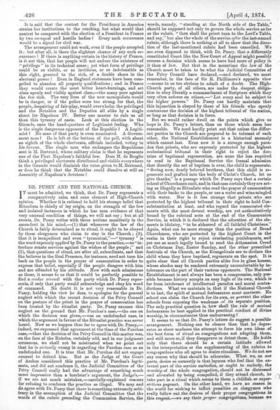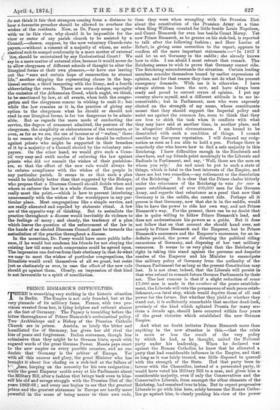DR. PUSEY AND THE NATIONAL CHURCH.
iT must be admitted, we think, that Dr. Pusey represents a comparatively calm and sane element of High-Church opinion. Whether it is rational to hold his strange belief that Ritualism is chiefly of lay origin, on the strength of the few and isolated instances in which he has seen evidence of that very unusual condition of things, we will not say ; but at all events, Dr. Pusey writes with three notions manifestly in the ascendent in his mind,—(l) that whenever the law of the Church is fairly determined as to ritual, it ought to be obeyed by those clergymen who claim to stay in the Church ; (2), that it is inexpedient and even "tyrannical,"—" tyranny " is the word expressly applied by Dr. Pusey to the practice,—to "in- troduce ornate services against the wishes of the people ;" and (3), that questions of ritual, are after all, subordinate, and that the believer in the Real Presence, for instance, need not turn his back on the people in the prayer of consecration in order to express that belief, especially if the people disagree with him and are offended by his attitude. Now with such admissions as these, it seems to us that it would be perfectly possible to find a modus vivendi with the party which Dr. Pusey repre- sents, if only that party would acknowledge and obey his word of command. No doubt it is not very reasonable in Dr. Pusey, holding the view he does, to apologise for the general neglect with which the recent decision of the Privy Council on the posture of the priest in the prayer of consecration has been treated by the ritualist party. Dr. Pusey excuses this neglect on the ground that Mr. Purchas's case,—the one on which the decision was given,—was an undefended case, in which the argument in favour of the Ritualist practice was never heard. Now as we happen thus far to agree with Dr. Pusey — indeed, we expressed that agreement at the time of the Purchas case,—that the decision of the Privy Council in this matter was, on the face of the Rubrics, certainly odd, and in our judgment erroneous, we shall not be mistrusted when we point out that he is virtually wrong in regarding the Purchas case as an undefended one. It is true that Mr. Purchas did not engage counsel to defend him. But as the Judge of the Court of Arches considered this practice of Mr. Purchaa's legiti- mate, and did not condemn it, the Judicial Committee of the Privy Council really had the advantage of something much more impressive than a barrister's argument, the Judge's,— if we are not much mistaken,—carefully-explained reasons for refusing to condemn the practice as illegal. We may and do agree with Dr. Pusey that there is something extremely arbi- trary in the assumption of the Judicial Committee that the words of the rubric preceding the Communion Service, the
words, namely, "standing at the North side of the Table," should be supposed not only to govern the whole service as far as the rubric, "then shall the priest turn to the Lord's Table, and say," but also the whole of the service after the last-named rubric, although there is nothing at all to show that the direc- tion of the last-mentioned rubric had been cancelled. We are even disposed to think, with Dr. Pusey, that a differently constituted Court like the New Court of Appeal might possibly reverse a decision which seems to have had more of policy in it than of law. But that in the meantime the law of the Church must be taken to be what the Judicial Committee of the Privy Council have declared, —an d declared, we must remember, in the face of Sir R. Phillimore's opposite view —seems to us too obvious to admit of a doubt. The High- Church party, of all others, are under the deepest obliga- tion to obey literally a commandment of Scripture which they very often enforce on others,—" Let every soul be subject to the higher powers." Dr. Pusey can hardly maintain that this injunction is obeyed by those of his friends who openly contravene the decision of the highest tribunal of the nation, so long as that decision is in force.
But we would rather dwell on the points which give us hope in Dr. Pusey's letters, than on those which seem less reasonable. We need hardly point out that unless the differ- ent parties in the Church are prepared to be tolerant of each other, the National Establishment is a historical anomaly which cannot last. Even now it is a strange enough para- dox that priests, who are expressly protected by the highest ecclesiastical tribunal in their right to reject the doe; trine of baptismal regeneration, are none the less required to read in the Baptismal Service the formal admission that directly the act of baptism is over, the child is regenerate. "Seeing now, dearly beloved brethren, that this child is re- generate and grafted into the body of Christ's Church, let us give thanks," is a passage which Dr. Pusey says that a certain school of Churchmen omit, and in thatcase certainly they are act- ing as illegally as Ritualists who read the prayer of consecration with their backs to the people, or use a wafer and wine mingled with water. Nor is it less strange that priests who are protected by the highest tribunal in their right to hold Con- substantiation at least, and who regard the consecrated ele- ments with the most devout worship, are yet authoritatively bound by the rubrical note at the end of the, Communion Service, in which it is declared that the adoration of the ele- ments is idolatry, "to be abhorred of all faithful Christians." Again, what can be more strange than the position of Broad Churchmen, who are protected by the highest Court in the realm in their right to reject everlasting punishments, and yet are as much legally bound to read the Atbanasian Creed on Christmas Day, Easter Sunday, and the other prescribed festivals of the Church, as the Evangelicals are to declare the child whom they have baptised, regenerate on the spot. It is quite clear that all Church parties alike live in glass houses, whose abodes may be rendered extremely uncomfortable by in- tolerance on the part of their various opponents. The National Establishment is and always has been a compromise, only pos- sible because history accepts an easy logic of its own, which is far from intolerant of intellectual paradox and moral contra- dictions. What we maintain is, that if the National Church is to last, the spirit of mutual forbearance must continue. No school can claim the Church for its own, or prevent the other schools from exposing the weakness of its separate position. The only practical question is, how shall the rule of mutual forbearance be best applied to the practical conduct of divine worship, in circumstances thus embarrassing ? It seems to us that Dr. Pusey's letters do suggest a possible arrangement. Nothing can be clearer than that he depre- cates as sheer madness the attempt to force his own ideas of the best form of ritual on congregations not adopting them, and still more so, if they disapprove or detest them. He bolds only that there should be a certain latitude allowed in the interpretation or the supplementing of the rubrics to congi egations who all agree to desire ritualism. We do not see any reason why that should be otherwise. What we, on our parts, desire so earnestly is that laymen who feel that the ex- ternal part of the service embodies, or ought to embody, the worship of the whole congregation, should not be distressed and alienated by being compelled, if they attend church, to take part in a ritual which seems to them a childish or super- stitious pageant. On the other hand, we have no reason in the world for wishing to inflict penalties on clergymen who really follow out the desires of their proper congregations in this respect,—we say their proper congregations, because we
do not think it fair that strangers coming from a distance to hear a favourite preacher should be allowed to overbear the wishes of the residents. Now, as Dr. Pasey seems to agree with us in this view, why should it be impossible for the vicar or rector of any parish church to be assisted by a ' Council,—chosen, suppose, by the now voluntary Church-rate payers,—without a consent of a majority of whom, no eccle- siastical suit to compel conformity in a mere matter of external ites, should be entertained by any Ecclesiastical Court ? We say in a mere matter of external rites, because it would never do to allow clergymen of different schools of thought to alter the liturgical forms at their own pleasure,—to have one leaving out the "sure and certain hope of resurrection to eternal life," another skipping the regenerating clause in the bap- tismal service, a third tampering with the litany, and a fourth abbreviating the creeds. There are some changes, especially the omission of the Athanasian Creed, which ought, we think, to be sanctioned by law, at all events, when both the congre- gation and the clergyman concur in wishing to omit it ; but while the law remains as it is, the practice of giving any option to the clergyman what he should or should not read in our liturgical forms, is far too dangerous to be admis- sible. But as regards the mere mode of conducting the service, the degree of ornament admitted, the posture of the clergyman, the simplicity or elaborateness of the vestments, or even, as far as we see, the use of incense or of "wafers," there is no reason why the penalties of the law should be enforced against priests who might be supported in their breaches of it by a majority of a Council elected by the voluntary rate- payers. On the other hand, we would give such a Coun- cil very easy and swift modes of enforcing the law against priests who did not consult the wishes of their parishion- ers, so that the effect of the new rule would always be to enforce compliance with the wishes of the people in any particular parish. It seems to us that such a plan would be infinitely better than that suggested by the Bishops, who propose that a Diocesan Council should decide when and where to enforce the law in a whole diocese. That does not really meet the point,—which is how to prevent interfering unnecessarily with the wishes of the worshippers in any par- ticular place. Most congregations like a simple service, and are really alienated and repelled by elaborate ritual. A few are of the opposite way of thinking. But to assimilate the practice throughout a diocese would inevitably do violence to the feelings of many ; and clearly, the tendency of a plan which leaves the question of the enforcement of the law in the hands of an elected Diocesan Council must be towards the assimilation of the practice throughout a diocese.
In the meantime, Dr. Pusey would have more public influ- ence, if he would but condemn his friends for not obeying the existing law till some such compromise could be agreed upon. The impression one derives from their obstinacy is, that do what we may to meet the wishes of particular congregations, the Ritualists would avail themselves of all we grant, bat resist just as obstinately as ever, in case the effect of the new rule should go against them. Clearly, an impression of that kind is not favourable to a spirit of conciliation.



































 Previous page
Previous page